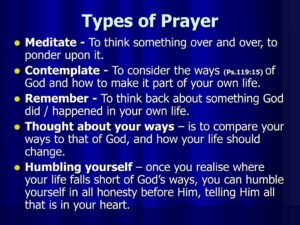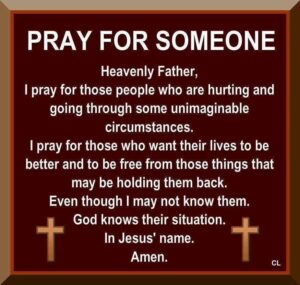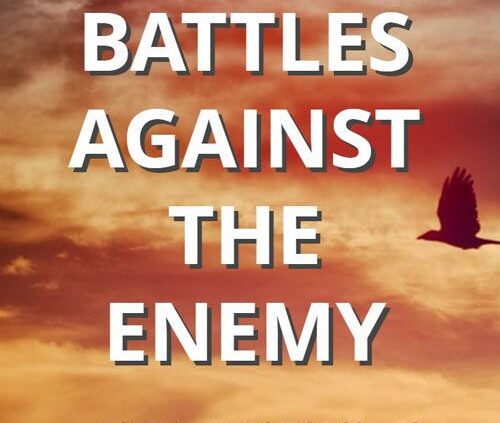Preaching on the Power of Prayer
Preaching on the Power of Prayer
We’ve been considering spiritual warfare over the past several weeks, especially focusing on the armor of God as our equipment for the fight. Now we turn to the subject of preaching on the power of prayer to your people. This, too, is part of the spiritual warfare weapons that we are provided.
Paul’s Instruction on the Power of Prayer
After explaining that we have a sword that is intended for intimate hand to hand combat, Paul turns in Ephesians 6 to the subject of prayer. This is what he says:
18 And pray in the Spirit on all occasions with all kinds of prayers and requests. With this in mind, be alert and always keep on praying for all the Lord’s people. 19 Pray also for me, that whenever I speak, words may be given me so that I will fearlessly make known the mystery of the gospel, 20 for which I am an ambassador in chains. Pray that I may declare it fearlessly, as I should.
Some Bible translations put a new paragraph here. However, there is no doubt grammatically that Paul is connecting these thoughts to the subject of spiritual warfare. So, when you preach about spiritual warfare, don’t forget that preaching on the power of prayer is part of the package.
Your Access to Power through Prayer
Many years ago I read a study that showed that the average Christian in the United States spends about 5 minutes a day in prayer. Pastors prayed about 9 minutes per day, according to the same study. I decided to check this out in my own life, and found that it was pretty accurate.
I grew up in Christian family. My parents sent me to Christian schools through high school. College education for me was at a Christian university. I attended seminary to prepare for ministry. However, no one really taught me to pray. People assumed, I think, that I would just catch on to it. So, I had some learning to do.
Prayer Power Through “All”
In this passage Paul uses the word “all” in four different ways.
When To Pray
 Paul says that we should pray on “all” occasions. The word “occasions” here means a “period of opportunity”. In other words, every time we sense a time that is appropriate for prayer, we should pray. This is very different from the traditional prayer life of the Jews. They had set times for prayer. Remember that Daniel prayed 3 times per day. That kind of structure guided the Old Testament prayers. However, Paul indicates that it is now a new day. Prayer is no longer limited to specific times and places, but is to encompass our day. Consider the following New Testament passages:
Paul says that we should pray on “all” occasions. The word “occasions” here means a “period of opportunity”. In other words, every time we sense a time that is appropriate for prayer, we should pray. This is very different from the traditional prayer life of the Jews. They had set times for prayer. Remember that Daniel prayed 3 times per day. That kind of structure guided the Old Testament prayers. However, Paul indicates that it is now a new day. Prayer is no longer limited to specific times and places, but is to encompass our day. Consider the following New Testament passages:
- “Jesus told them a parable to show them that they should always pray and not give up.” Luke 18:1
- “Be joyful in hope, patient in affliction, faithful in prayer.” Romans 12:12
- “Devote yourselves to prayer, being watchful and thankful.” Colossians 4:2
- “Pray continually”. I Thessalonians 5:17
This is not to say that we never use a set time for prayer. I have found in my own journey to deeper prayer that I need to start my day out with a time of devotion and prayer. If I don’t do that, I find that I don’t pray much during the day. More about that later. This is part of what preaching on the power of prayer is all about.
What to Pray For
Paul also says in this Ephesians passage that we are to pray, “…with all kinds of prayers and requests.” The word  translated “prayers” here is a word that can encompass a variety of kinds of general prayers, including things like praise, confession, watching, petition, etc. The word translated “requests” in the NIV is an updated translation of a word that used to be “supplications”. The root of the word means “to beg”, or “to want”. In other words, these kinds of prayers focus on other people, as well as on yourself and your needs. Preaching on the power of prayer involves praying all kinds prayers.
translated “prayers” here is a word that can encompass a variety of kinds of general prayers, including things like praise, confession, watching, petition, etc. The word translated “requests” in the NIV is an updated translation of a word that used to be “supplications”. The root of the word means “to beg”, or “to want”. In other words, these kinds of prayers focus on other people, as well as on yourself and your needs. Preaching on the power of prayer involves praying all kinds prayers.
I think it is legitimate to expand on Paul’s list. I think all kinds of prayers and requests could mean also that there are a variety of ways to pray: group prayer, individual prayer, silent prayer, arrow prayers, kneeling prayers, prostrate prayers, written prayers, spontaneous prayer, etc. Keep this in mind as you think about praying on the power of prayer in the lives of your people.
The Power of Prayer Resolution
Paul goes on and says, “With this in mind, be alert and always keep on praying.” I think that Paul is saying here that we have to keep watch for things to pray for the Kingdom, for our family and friends, and for ourselves. In my last church there was a woman of prayer. Whenever we’d be talking about things in the church or in the lives of missionaries that we supported, she would say, “We’d better pray.” And then she would begin praying. This is the kind of thing Paul is encouraging here.
Who To Pray For
 Paul concludes this sentence by saying that we should pray “for all the saints.” In other words, whenever we hear about someone in need, we should pray.
Paul concludes this sentence by saying that we should pray “for all the saints.” In other words, whenever we hear about someone in need, we should pray.
Conclusion
We’ll continue this consideration in the next post. In the meantime, here is video full of encouragement to be a person of prayer. And here is an excellent sermon on this passage.



